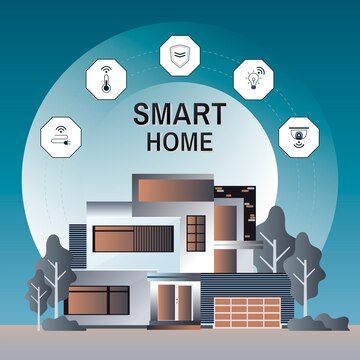Basic Smart Home Recommendations for A Beginner
A few decades ago, setting up a smart home was a complicated undertaking that necessitated the use of connectivity, programming, and other DIY talents. Moreover, installing smart home devices was also an expensive investment that only the wealthy could pursue.
Today, it is no longer necessary to be wealthy to own a smart home, and it is certainly not necessary to undergo specialized training to construct one. With a few simple, smart home recommendations, you may enjoy a more pleasant way of life in your home. What is the best way to start as a newcomer to smart home technology?

6 Basic Smart Home Recommendations
Let us begin with the fundamentals of the most widely utilized Smart Home alternatives available on the market today. The following smart home recommendations are easy to use and implement. Moreover, they are among the most reasonably priced smart home technologies available today.
1.Smart TVsA TV is one of the essential devices in almost every home today. Many homes are ditching their analog TVs for smart ones. Either you may purchase a smart TV that streams Netflix, Hulu, Amazon, and other services directly from the device itself, or you can get a system that connects to your existing television.
You can watch virtually anything on a smart TV, anytime you want, regardless of whether or not your home has wiring for television.
2.Smart SpeakersSmart speakers are capable of far more than simply playing music. They can perform internet searches, provide weather forecasts, provide news updates, serve as a personal assistant, and serve as the centralized power base for the comprehensive Smart-Home network.
When you have the appropriate smart speakers, you can automate practically every element of your house just by speaking into them. You can use Alexa to find out who is at the entrance door; utilize Siri to switch off the lights, or Google to crank down the temperature.
3.Smart LightsChoosing innovative lighting systems over conventional lighting systems has several advantages, the most important of which is that you save money on your monthly electricity expenses. Smart lights use less energy than regular light bulbs, and they are becoming increasingly popular with many homes today.
Two alternatives exist when it comes to intelligent lighting. The initial step involves the installation of smart light switches that allow you to control various functions such as dimming or turning on and off the lights with an app on your smartphone.
The following intelligent lighting solution is smart bulbs, which you can use to convert standard light bulbs into smart lights. Smart switches are the more economical choice, but their installation can be time-consuming and difficult.
In addition to providing more illumination options, such as dimming or soft light, smart bulbs are more costly since they necessitate the acquisition of a translator base to make interaction with your other smart devices possible.
4.Smart ThermostatsThanks to smart thermostats, it is possible to keep track of your HVAC system from any location. You may also put them on a timer, so they do not run when nobody is around, saving electricity. Several smart thermostats also have a sensor feature that enables them to make temperature adjustments independently if they determine it is necessary.
5.Smart KitchenOne of the best smart home recommendations is installing a smart kitchen. You do not need to break down walls to make more room, nor do you need to be wealthy, famous, or even highly tech-savvy to include some intelligent devices in your kitchen.
Innovative kitchens are anything connected to IoT (Internet of Things) technology, Bluetooth, or Wi-Fi. An intelligent gadget links to other technology, making it simple to operate. You can operate it from a distance using a mobile application or an innovative home platform such as Amazon Alexa or Google Assistant.
A few of the smart devices that can help to make things in an intelligent kitchen more efficient, more precise, and safer include, but not limited to the following:
- Cocktail scale
- Full-sized blender
- Meat thermometer
- Smart fridge
- Sous vide
- An Instant Pot
Doorbells with video capabilities not only detect and tell you when there is someone at the front door, but they also show you video footage of the person. They use intercom technology to converse with your visitor, saving you the agony of shouting to inquire who is at the front door.
Wrapping Up
The above list of smart home recommendations is by no means exhaustive. Making the switch from traditional to smart technology may cost you some money upfront, but you will save a lot in the long run. Choosing suitable smart devices is the next step to making the transition complete.